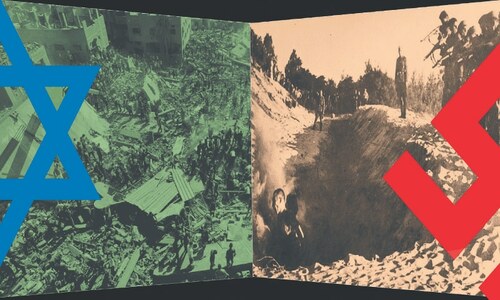History is written by victors’ is a phrase often used by people. But most historians detest it. They see it as an impulsive outcome of anti-intellectualism. Recall how Donald Trump reacted to his defeat in the 2020 US presidential election. He claimed the election was ‘stolen.’ To his followers, this is part of history. Millions in the US still believe this. Therefore, this is not a case of history being written by the victor and believed by a large body of people.
Imran Khan, before he came to power in 2018, was shaping narratives about the country’s political history. He was not yet in power. In fact, he had lost three elections and boycotted one. He wasn’t a victor, but on the losing side. Yet, his version of history was lapped up by vast segments of society.
Khan’s government was ousted in 2022. But even his post-ouster narratives have overwhelmed those of his opponents who are in power. He is churning out these narratives from jail as a politician who lost a power struggle two years ago.
Indeed, all this is about immediate history. But there are enough long term examples as well to substantiate the fact that history is not always written by victors. For instance, the history shaped in the southern states of the US that had seceded from the rest of the country in 1861, and were then defeated by the federal armies of the north, found a lot more takers in the south than the history written by the victorious north — despite this history becoming part of the national curriculum.
National narratives are not necessarily shaped by victors but more so by those in power and those who have amassed a large following. However, over time, most such self-serving accounts either erode away or are replaced by narratives that serve the leaders of the time
In this regard, history written by the losers portrayed slave-owning southerners as proud and brave people who had stood up to an arrogant north, against daunting odds. This understanding of the American Civil War is still popular in many southern states. A popular history authored by the losing side and accepted by many.
In 1962, Chinese forces defeated Indian forces in a brief but bloody war. On most occasions, Indian textbooks simply ignored the conflict or only briefly discussed it as ‘Chinese aggression.’ This is what has stayed in the imagination of most Indians. However, in a much more bizarre move, in 2017, textbooks in the Indian state of Madhya Pradesh claimed that it was India that won the conflict. Of course, no evidence was given.
These are thus reactionary histories — heavy on emotional content and extremely low on evidence. One can understand them as populist histories as well. So, often, it is actually the losers who become the most active writers of history and the most influential.
Pakistani armed forces lost the 1971 war against India and, with it, the country’s eastern wing. After the conflict, textbooks weaved a ‘lost cause myth’, like the one shaped in the southern states of the US. As demonstrated by historians such as KK Aziz and Rubina Saigol, the myth, in this case, was about Pakistani forces gallantly battling powerful international and local conspiracies that were launched to break Pakistan.
Many historians often bemoan that young Pakistanis don’t have a clue about their region’s history, other than the one they are taught in educational institutions. This is true. Recently, a lot of Khan’s young supporters were baffled to learn about certain bits of history that they had never read in their school textbooks.
But this is not because they began to read books that convincingly debunk their textbook knowledge. It is because their favourite vloggers and TV anchors started to venture towards bits of history that lie outside textbooks.
Yet, these bits of history are cherry-picked to serve a certain narrative, without knowing the complete account. Instead of going beyond the bits, they are trying to use them as a way to ‘substantiate’ the evil ways of the state against Khan. Khan required these bits to further bolster his post-ouster narrative. However, Khan’s own controversial history, no matter how well documented, is treated as ‘propaganda.’
The notion that history is written by victors is probably more to do with history written by those in power. But such histories only last till they are in power. Textbooks glorify them. But once they lose power, their ‘history’ changes. In a 1964 Pakistani textbook, A Beginner’s History of Indo-Pakistan, the then military ruler of Pakistan, Gen Ayub Khan, is given multiple pages of outright praise. A 1968 Urdu textbook dedicates five pages to Ayub, eulogising him.

But in 1970, when this Urdu textbook’s English version was published (Social Studies: History and Civics), the five pages that had lavished praise upon Ayub in the Urdu version were omitted because, by then, the Ayub regime had fallen. 1972’s textbook Social Studies: Geography, History & Civics celebrated the arrival of ZA Bhutto’s regime and of democracy.
And even though East Pakistan had broken away in December 1971 to become Bangladesh, the textbook continued to treat East Pakistan as part of Pakistan. This textbook was in use till 1974. This means that even three years after the separation of the country’s eastern wing, students were being taught that it was still a part of Pakistan. This was rectified only when the Bhutto regime decided to accept Bangladesh.
Textbooks published during Gen Ziaul Haq’s military regime (1977-88) are all hostile towards Bhutto. 1984’s Mutala’a-i-Pakistan — Lazmi ascribes Bhutto’s fall to his ‘failure in serving Islam.’ Zia, on the other hand, is presented as a man who introduced ‘proper Islamic policies’ and ‘saved Pakistan.’ However, in 2017’s Mutala’a-i-Pakistan, Zia is given just a single paragraph, stating that he imposed Pakistan’s third martial law.
This has gone on for decades. Whoever is in power is praised in textbooks, and then severely criticised after they lose power. This has nothing to do with the resigned notion of ‘history is written by victors.’ History is written by historians. Indeed, some may write it to serve the interests of those in power, but most historians understand that history is an evolving entity. New sources continue to be discovered that keep updating histories.
Historians explore primary sources and secondary sources to shape a convincing reading of events. Primary sources are rooted in literature and artefacts that belong to the period of the event. But they are largely impressions of that period, directly impacted and influenced by the events. They are thus likely to be subjective. Secondary sources are therefore used to contextualise the primary sources to better understand the events beyond their subjective reading by victors, as well as losers.
Published in Dawn, EOS, September 8th, 2024















































Dear visitor, the comments section is undergoing an overhaul and will return soon.